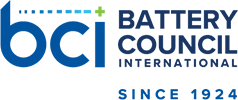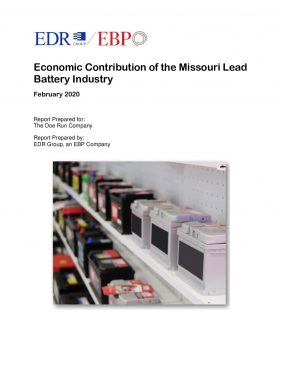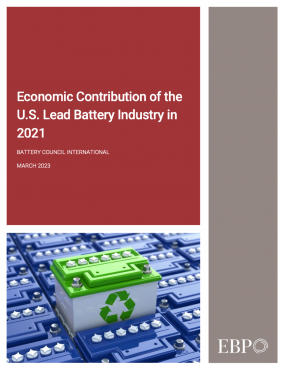The Sustainable, Circular Economy of the Industry Enables 8,150 Jobs Across the State
CHICAGO – February 18, 2020 – In conjunction with Battery Day, February 18, a new report finds that batteries hold a place of honor in Missouri. The lead battery industry delivers $2.5 billion annually in overall economic impact in Missouri, including 3,210 direct jobs, and supports 8,150 total jobs across the state, according to the study, “Economic Contribution of the Missouri Lead Battery Industry.”
Driven by major employers, like The Doe Run Company (Doe Run), EnerSys, Exide Technologies and Clarios, the study illustrates the positive economic impact provided to American workers and their communities by companies that support the lead battery industry through mining, manufacturing and battery recycling. In Missouri alone, the industry spends $257 million annually on payroll for more than 3,200 jobs in a variety of occupations, many of which are accessible to those who have only a high school diploma. Missouri’s lead battery industry also supports 2,350 supplier jobs and 2,590 jobs from worker spending in different industries. Beyond its direct job impact, the Missouri lead battery industry annually supports:
- $527.3 million in labor income
- $227 million in tax revenue[1]
- $2.5 million in R&D spending
“Nationwide, the U.S. lead battery industry, of which Missouri is a valued contributor, provides more than 92,000 total jobs, and an economic impact of $26.3 billion annually. We’re proud to participate in the highest growth in manufacturing jobs within the past 30 years, which gives thousands of Americans access to better than average paying careers,” Roger Miksad, executive vice president, Battery Council International (BCI).
The national Economic Contribution of the U.S. Lead Battery Industry study found that compared to other private sector jobs, average salaries in the lead battery industry are 96% higher for recycling and mining workers.
[1]Taxes include employee contributions to social insurance, sales taxes, property taxes, motor vehicle license fees, severance taxes, corporate taxes, personal income taxes, and other miscellaneous taxes.
“Missouri is a home for companies that represent all the steps of our successful circular economy model – mining, manufacturing, use, collection, recycling, material sourcing and repeat,” said Miksad.
Lead batteries play a critical role in a greener, more environmentally sustainable economy. Globally, lead batteries power over 1 billion cars, including electric and hybrid models, and 70% of global rechargeable energy storage needs are met by this technology.[1]
The lead battery industry is also one of only 16% of U.S. businesses that have moved to a circular economy, otherwise known as a closed-loop production model. With its 99% recycling rate, 130 million lead batteries are recycled every year. The lead metal and plastic recovered through the recycling process are re-used to manufacture new batteries. In fact, about 80% of a new lead battery is comprised of recycled material.
Doe Run’s mining, recycling and metal production operations in Southeast Missouri represent several steps in the successful circular economy model, and contribute more than $1 billion to the state’s economy, totaling nearly half of the lead battery industry’s economic impact in Missouri. Additionally, Doe Run provides $112.3 million in payroll to over 1,100 Missouri employees, and supports a total of 3,480 direct, indirect and induced jobs. The company also supports Missouri businesses by buying local. In 2018, the company spent more than $181 million with nearly 700 Missouri vendors.
“Our goal is to sustain our business for the long term and thereby provide quality products to our customers and enduring benefits for our employees and the communities,” said Jerry Pyatt, Doe Run president and CEO. “We continue to invest in innovation and operations in Southeast Missouri, so we can remain a major employer in this area well into the future. This includes providing nearly $179,000 in 2018 toward educational opportunities in science, technology, engineering and math (STEM) programs, and university scholarships that can put students on the path to successful careers in our industry.”
“A key factor in our decision to locate a $35 million state-of-the-art manufacturing facility in Kansas City, Mo., was the proximity to some of the most advanced lead alloy and mining technology in the U.S.,” said Tim Vargo, chairman, president and CEO of Exide Technologies, a global provider of stored electrical-energy solutions for the transportation and industrial markets. “Convenient access to advanced lead technology enables Exide to efficiently manufacture the high-quality, longer-lasting and more durable batteries our customers require in each of our business segments.”
When Pennsylvania-based EnerSys, a global leader in stored energy solutions for industrial applications, wanted to expand its production capacity, it acquired a Springfield company that complemented its existing Missouri operations. “The manufacturing processes and quality standards of NorthStar were very similar to one of our growing product lines,” said David M. Shaffer, president and CEO of EnerSys. “We were very impressed with the proven expertise and training of the Springfield production teams and that will accelerate our growth in parallel with the increasing worldwide demand for batteries used for the motive power, transportation, telecom and uninterruptible power supply industries.”
The Economic Contribution of the U.S. Lead Battery Industry was prepared by the Economic Development Research Group at the request of Essential Energy Everyday and BCI.
About Battery Council International
Battery Council International is the North American trade association representing the lead-based battery manufacturing, supply, recycling and distribution companies. For more information on the association, visit www.batterycouncil.org.
About The Doe Run Company
Based in St. Louis, The Doe Run Company is a privately held natural resources company and a global provider of lead, copper and zinc concentrates. Dedicated to environmentally responsible mineral and metal production, Doe Run operates one of the world’s largest, single-site lead recycling centers, located in Boss, Mo., and mines from one of the world’s largest lead mining districts, also in Missouri. The Doe Run Company and its subsidiaries deliver products and services necessary to provide power, protection and convenience. Doe Run has operations in Missouri, Washington and Arizona. For more information, visit www.doerun.com.
About EnerSys
EnerSys, the global leader in stored energy solutions for industrial applications, manufactures and distributes reserve power and motive power batteries, battery chargers, power equipment, battery accessories and outdoor equipment enclosure solutions to customers worldwide. Motive power batteries and chargers are utilized in electric forklift trucks and other commercial electric powered vehicles. Reserve power batteries are used in the telecommunication and utility industries, uninterruptible power supplies, and numerous applications requiring stored energy solutions including medical, aerospace and defense systems. EnerSys provides highly integrated power solutions and services to broadband, telecom, renewable and industrial customers. Outdoor equipment enclosure products are utilized in the telecommunication, cable, utility and transportation industries, and by government and defense customers. The company also provides aftermarket and customer support services to its customers from over 100 countries through its sales and manufacturing locations around the world.
About Exide Technologies
Exide Technologies (www.exide.com) is a global provider of stored electrical-energy solutions for the transportation and industrial markets. Exide’s 130 years of technology innovation combined with operations in more than 80 countries enables the company to deliver compelling solutions for the world’s current and future power needs. Exide produces and recycles a broad range of products, serving the Transportation, Network Power and Motive Power market segments with battery and energy storage systems and specialty applications for a broad range of industries including: agricultural, automotive, electric, light and heavy-duty truck, marine, materials handling, military, mining, powersport, railroad, security, telecommunications, utility and uninterruptible power supply (UPS), among others. Exide is Powering the World Forward – history and scale combined with a start-up mentality make Exide the right choice for customers who want more than simply a battery supplier.
[1]Taxes include employee contributions to social insurance, sales taxes, property taxes, motor vehicle license fees, severance taxes, corporate taxes, personal income taxes, and other miscellaneous taxes
[2] “Renewable Energy Storage,” July 9, 2018, Essential Energy Everyday





